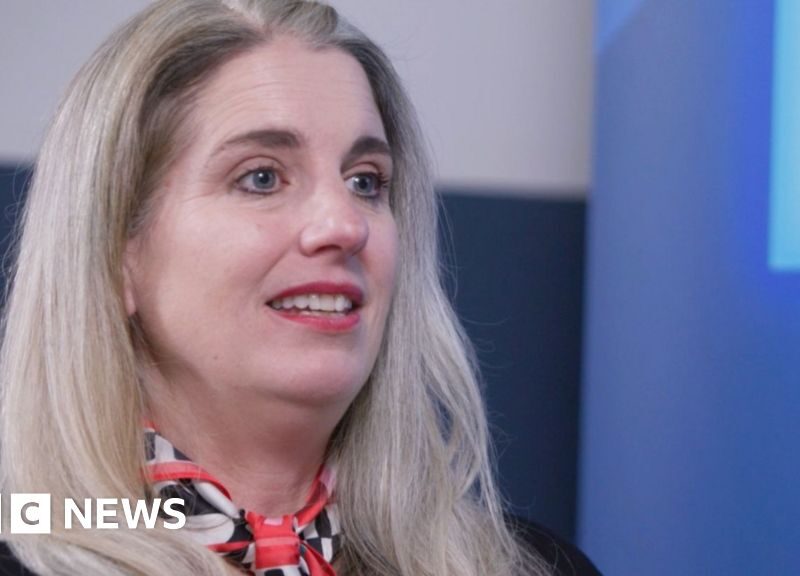 Deanie Chen
Deanie ChenIn April, a fan approached American singer Gigi Perez after a show, and proudly showed off their latest tattoo.
“Gigi I ???? U,” read the ink. The singer was lost for words.
“In my head, I was like, ‘Please don’t regret that’,'” she laughs.
“It’s hard for me to process that somebody else has my name permanently on their skin.
“But, I mean, it’s just the ultimate honour to know that the music impacted them so greatly that they would do that.”
It was the first time anyone had felt passionately enough to turn her name into a tattoo – and the timing could not have been better.
Six months earlier, Gigi been dropped by her record label, in the middle of a promotional trip to London.
And after having to move back to her parents’ house, in Florida, the 24-year-old singer-songwriter had to reassess her life.
“I was free falling,” she says.
“I had no income, I was back home, and I was starting to doubt myself.
“But I was like, ‘Let me just give myself a year to learn how to record and produce my own records.
“From there, if I need to get a job so I can still make music, I’ll do that.
“And then everything happened…”
Everything, in case you have not been following Gigi’s story, involved scoring a global hit single out of nowhere.
Sailor Song, an aching love ballad about falling for a woman who looks like the actress Anne Hathaway, exploded online in June and quickly became a real-world success.
In the UK, it went to number one, ending Sabrina Carpenter’s nine-week run at the top.
The song also reached the summit in Ireland and Latvia and made the top 10 everywhere from New Zealand to Belgium.
“I knew the song was special to me,” Gigi says.
“I just didn’t know it was going to be special to so many other people.”
When she found out it had reached number one, “I got out of the shower and just started crying,” Gigi told the UK’s Official Charts Company.
 Coco Mendez
Coco MendezThe success marks a neat conclusion to a messy origin story.
Born in New Jersey and raised in Florida, Gigi was a drama school nerd who turned to music when she realised she was “never going to be cast in the ingenue role”.
Self-taught on piano and guitar, she went straight to the top of the US streaming charts, in 2021, with her self-released debut single, Sometimes (Backwood).
The song earned her a contract with Interscope Records and Gigi supported Coldplay on their Music of the Spheres tour before she had even played a headline show of her own.
Looking back, she says that initial wave of success created a pressure to expand her career too quickly. For a long time, she felt “stuck and limited” by her lack of progression.
“It was this cognitive dissonance where I’d get an amazing slot [on someone else’s tour] but didn’t know who’d be coming to the show,” Gigi says.
And by the time she played London last November, she knew she had reached breaking point.
“I asked God, or the universe, ‘Open the doors that need to be opened and close the doors that need to be shut,'” she says.
“I knew it had to happen – but I was so terrified of what that meant.”
‘Not a democracy’
Interscope released her two days later. But instead of the world ending, Gigi’s energy renewed. She wrote more songs – and taught herself how to produce them, by watching YouTube tutorials.
Sailor Song came to her in a sudden burst of inspiration this February.
“I was on my bed, my door was open and I was just messing around, jamming,” Gigi says.
“My little sister walked by, and she was like, ‘Gigi, what was that?’ And I was like, ‘I have no idea, but I think it’s really cool.'”
“There are times where I spend a lot of time thinking about a song and what I want to say. This was one of those times where it just blew out.”
She teased it on TikTok in April, released it in July – and, as of Wednesday 20 November, it has been streamed 340 million times on Spotify alone.
In some ways, it is an unlikely hit. The production is low-tech and homespun and Gigi’s vocals are androgynous to the point where many listeners were surprised to find it was a song about two women in love.
But the chorus is undeniable.
“Kiss me on the mouth and love me like a sailor,” she sings. “And when you get a taste, can you tell me, what’s my flavour?”
Of course, in our terminally divided culture, no success remains untainted for long.
In the US, evangelical Christians criticised Sailor Song for the line: “I don’t believe in God, but you’re my saviour.”
Gigi’s response, posted to TikTok, was uncompromising.
“My songwriting is not a democracy,” she wrote, “and that applies to every artist’s work.”
 Nae
NaeThe singer’s struggles with faith run deep.
Her parents became born-again Christians when she was in primary school, after which her mother took extra work as a bus driver to pay for Gigi and her sisters to attend a private religious school in Florida.
The experience was not all positive.
“Growing up gay in an environment where you’re not allowed to be that was very taxing on me,” Gigi told the Bringin’ It Backwards podcast, in 2022.
Her faith was really shaken, however, when her big sister Celene died suddenly, aged 22, in the early months of 2020.
The shock and the pain are unimaginable. The foundations of Gigi’s world were destabilised forever.
In her music, she tried to explain the unexplainable.
“The other day, I thought of something funny/ But no-one would’ve laughed but you,” she sang in a song simply called Celene.
“And Mom and Dad are always crying/ And I wish I knew what to do.”
Gigi’s latest release, Fable, is another attempt to confront that grief, lashing out at people who feebly offered “thoughts and prayers” after her sister’s death, and wondering why disconnecting from faith makes her “skin start to burn”.
“One of the hardest parts about my grief is that I didn’t have any music that touched on my life, on my situation, to get me through it,” she says.
“And so I made it for myself.
“I’ve written tons of grief songs but, finally, in Fable, I said it in the way I always felt, from the very day I lost her, and I was so just relieved by the expression of it.”
That catharsis is a sort of self-healing. And, more than anything, the singer wants her music to find its way to others who need it.
“One of my biggest wishes is to not let this experience that is so dark and isolating stay that way,” she says.
“My hope is that there can be some way this [music] can help. And it’s amazing, because I’ve been seeing a lot of that. It’s been very healing for me.”
And with that ability to reach people in their most vulnerable moments, it won’t be long before Gigi sees her name tattooed on many more arms.



